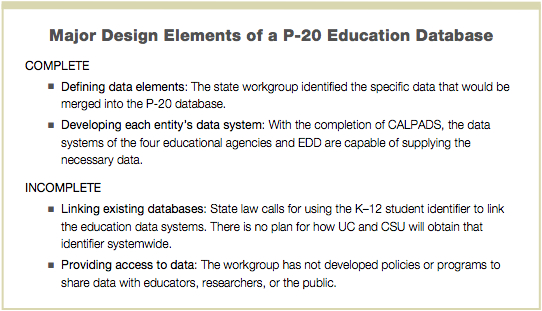California Education Data More Crucial as Funding and Standards Change

 Credit: hxdbzxy / Shutterstock.com
Credit: hxdbzxy / Shutterstock.com
Most of California's educators are excited about the new funding formula that'll help struggling school districts. They're also being phased into teaching through Common Core standards, while new standardized tests are developed. However, a crucial part of making sure this all works effectively and is conducive to educational goals is currently missing.
The Public Policy Institute of California (PPIC) delved into the state of education data in an August 2013 report, and found:
"The state has made considerable progress in building an educational data system. Unfortunately, it remains unfinished. We have a large accumulation of data, but they remain inaccessible to most of those who could use the information to improve the quality of education in California."
The PPIC is referring to the incomplete P-20 system, which would help longitudinally track student academic progress from pre-kindergarten to K-12 all the way through college to workforce outcomes. Outlined is the progress of the P-20 system:
Credit: PPIC.org
So, why is it helpful to have all this data about a student and his or her performance from the first day of class to the first day on the job? It's not about academic advisors looking over a student's shoulder every step of the way. It's not about a college admissions officer or potential employer looking into your history before evaluating your application or scheduling an interview.
If the state wants to make the best education policy decisions, it should know what works and what does not work. Part of doing that is analyzing meaningful data that isn't fragmented over the years. Does a certain policy in K-12 lead to higher college admissions or higher employment? Policymakers and school administrators can't be sure with the current system of education data.
The current system of tracking student progress falls short of what P-20 envisions:
"It is estimated that 15 to 20 percent of school-aged children move to another school each year; and without a statewide longitudinal data system, the schools or districts that accept mobile students often have very limited information on their prior achievement."
Educators, parents, and students can ban together to request policy changes and give recommendations to lawmakers, but lawmakers and education experts would still be perplexed on crafting a solution without solid data.
It may not be the most exciting or flashiest of policy decisions, but accountability and education data in California is underdeveloped. At a time when policies are drastically changing, a system of data collection and determining what it all means becomes more useful.
Do you see any flaws in having a detailed database of student progress, similar to the P-20 system? Is there potential for the data to be mishandled? Governor Brown has been opposed to establishing a large database because of costliness; is this a necessary cost considering California's history tight budgets?



